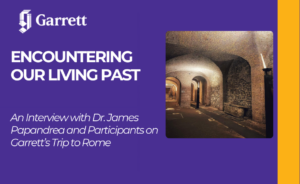Encountering Our Living Past
November 1, 2024
An Interview with Dr. James Papandrea and Participants on Garrett’s Trip to Rome

Beneath the Basilica of San Clemente’s ornate cathedral lies a secret: Travel through the archaeological layers and one will find a 4th Century church. Descend further, and you’ll find the remains of a Roman house where Christians worshipped as early as the 1st and 2nd centuries. The Basilica is one of many holy sites where Dr. James Papandrea takes students on his biennial travel course to Rome, but it also expresses the trip in microcosm. For Garrett Seminary’s Professor of Church History and Historical Theology, the class isn’t an opportunity to be a tourist, it’s a chance for students to excavate the foundations of their own faith. “I want the trip to be a spiritual pilgrimage,” Dr. Papandrea explains. “It explores the dimensions of being on holy ground, praying in the places where our ancestors prayed—even praying in their words as much as possible.”
Chelsea Guanzon, a MDiv student seeking ordination within the United Methodist Church, did not expect the overwhelming emotions that ritual stirred. In the room where many believe that Paul wrote his prison epistles, she revisited the apostle’s words in ways that added new dimensions. “I’ve been dealing with a lot of things in the past year, and Phillippians has been close to my heart throughout that journey,” she says. “Instantly I felt the sacredness. I found a quiet place and read through the entire epistle—I began to cry, the feeling of connection to God was so strong.” For Ph.D. student Ragy Ibrahim Mikhaeel, that experience bridges the gap between scholarship and faith. “The tour is deeper than learning historical facts,” he says. “To see how Paul wrote his masterpieces in this prison house, it was a live lesson on victory in and with Christ through the harsh circumstances of our own lives.”
Their reflections mirror Dr. Papandrea’s broader approach to church history. “I decided very early on in my career that I was not going to teach the kind of history class where you memorize names and dates and then regurgitate them,” he says. “I want to teach history classes that answer questions: Why? Why did people do that?” To help students enter this frame, Dr. Papandrea provides ample opportunities for journaling; balance between engaging history and processing its contemporary meaning is the course’s beating heart. “History is alive,” Dr. Papandrea notes. “To say history is relevant is not nearly enough. The ancient expression of the Christian faith isn’t just relevant, it is the very air we breathe.”
Amy Gilmore also traveled with the group. A lifelong Methodist, she serves as a church administrator but has been weighing whether theological education could help her feel better equipped as her work responsibilities expand. In this period of discernment, brushing against church history prompted new dimensions for biblical understanding. “To be in the same room where Paul spent his final days, it makes you reflect, ‘Wow, this really happened,’” she says. “I’m taking New Testament right now and I chose to do my thesis on Acts because of Paul. I want to dig deeper and understand more—a lot of that came from this trip.”
Even though Dr. Papandrea has led this course for decades, witnessing how the Holy Spirit moves among participants never gets old. “God works through the material world, not only through the incarnation of Jesus Christ but through sacred spaces,” he says. “It’s dangerous if Christianity becomes something only expressed through the mind, instead of a fully embodied faith.” From standing in the Piazza Navona, where early Christians were martyred to visiting Peter’s tomb in the catacombs beneath the Vatican Basilica, students can feel echoes from that great cloud of witnesses who came before us in the faith. For Dr. Papandrea, that visceral understanding of history is essential to cultivate the next generation of Christian leaders. “The Church is a living entity, it’s the mystical body of Christ,” he says. “I had that encounter experience in Rome when I was a student, and I want to open that door for others, so they can help congregants understand early Christians’ actions and intentions.” For Ragy, that hope has taken root. “I found historical facts unfolding before my eyes and stored them in my memory,” he says, “but now that history is alive in me. It becomes part of you.”

